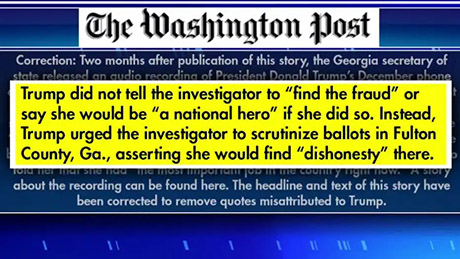by WorldTribune Staff, March 18, 2021
The corporate media’s fraudulent coverage of the disputed 2020 election in Georgia went well beyond The Washington Post’s fabricated quotes from a single anonymous source, a columnist noted.
“It wasn’t just the quotes they got wrong about Georgia. It was pretty much everything,” Mollie Hemingway concluded in a March 17 analysis for The Federalist.
 The Post, which only recently admitted the quotes were fake, used them “as a basis to speculate” that President Donald Trump “committed a crime,” Hemingway noted.
The Post, which only recently admitted the quotes were fake, used them “as a basis to speculate” that President Donald Trump “committed a crime,” Hemingway noted.
The “find the fraud” comments attributed to Trump which the Post conjured out of thin air were cited in the Democrats’ impeachment brief and during the Senate impeachment trial.
“But the fake quotes, bad as they were, are just one of many ways the media have done a horrible job of covering election disputes in the state,” Hemingway noted.
Remarkably, the media earlier echoed the same complaints about voting data fraud and computer voting systems that made by supporters of former President Donald Trump after the Nov. 3, 2020 election.
Such complaints have led to widespread social media censorship of those making them along with charges they were used to incite an insurrection against the U.S. government on Jan. 6.
“Georgia’s Election Mess: Many Problems, Plenty of Blame, Few Solutions for November”, blared a June 10, 2020 headline in The New York Times. In the piece, Richard Fausset and Reid Epstein write about the “disastrous primary election” in June that was “plagued by glitches, but Democrats also saw a systemic effort to disenfranchise voters.”
The NY Times article cited irregularities with absentee ballots and peculiarities at polling sites, and that the state’s voting system (Dominion Voting Systems) had suffered a “spectacular collapse.” The article said it was unclear whether the problems were caused by “mere bungling, or an intentional effort” by Secretary of State Brad Raffensperger and fellow Republicans in his office.
“Georgia’s troubled system” would be exacerbated by voting by mail and the increased burden of handling absentee ballots, the article said. The “trouble that plunged Georgia’s voting system into chaos” was related to its Dominion Voting Systems, “which some elections experts had been sounding alarm bells about for months.”
According to the current corporate media narrative, Hemingway wrote, “the Georgia presidential election was as perfectly run as any election in history, and anyone who says otherwise is a liar. To push that narrative, the media steadfastly downplayed, ignored, or prejudiciously dismissed legitimate concerns with how Georgia had run its November 2020 election and complaints about it.”
The same media was pushing a much different narrative prior to the election.
“Georgia likely to plow ahead with buying insecure voting machines,” wrote Politico’s Eric Geller in March 2019 about the plan to replace voting machines in the state.
A Washington Post report, “As Georgia rolls out new voting machines for 2020, worries about election security persist”, stated that “election security experts said the state’s newest voting machines also remain vulnerable to potential intrusions or malfunctions — and some view the paper records they produce as insufficient if a verified audit of the vote is needed.”
Hemingway pointed out that “if critics on the right were to restate these complaints now, it is likely that tech platforms would ban them or otherwise constrain their free discussion. The same media outlets would likely characterize these claims and concerns as unfounded.”
The Trump campaign’s official claims in its lawsuit filed on Dec. 4, 2020, “were sober and serious,” Hemingway noted. “They weren’t alleging foreign meddling or outside hacking, as The New York Times, Washington Post, Politico, and Atlanta Journal-Constitution warned just months earlier were serious concerns.”
Hemingway continued: “The Georgia Supreme Court had previously ruled that challengers to an election don’t need to show definitive fraud with particular votes, just that there were enough irregular ballots or violations of election procedures to place doubt in the result. Judges never want to overturn the results of an election, but under Georgia law, the remedy for showing enough problems to cast doubt was that a new election be held. One was already scheduled for early January for Senate runoff races.”
Trump’s lawsuit argued that it appeared votes had come from:
• 2,560 felons,
• 66,247 underage registrants,
• 2,423 people who were not on the state’s voter rolls,
• 4,926 voters who had registered in another state after they registered in Georgia, making them ineligible,
• 395 people who cast votes in another state for the same election,
• 15,700 voters who had filed national change of address forms without re-registering,
• 40,279 people who had moved counties without re-registering,
• 1,043 people who claimed the physical impossibility of a P.O. Box as their address,
• 98 people who registered after the deadline, and, among others,
• 10,315 people who were deceased on election day (8,718 of whom had been registered as dead before their votes were accepted).
The allegations would potentially disqualify nearly 150,000 illegal votes in a state that Biden allegedly won by only 12,000.
“But as legitimate as the lawsuit was, it entered a Kafka-esque world where it couldn’t get heard,” Hemingway noted.
Trump’s lawsuit is a key to shooting down the narrative pushed by the corporate media that the president had asked state election officials to “find” votes or “find the fraud.”
“Anyone familiar with the lawsuit knew Trump was saying his team had already ‘found’ nearly 150,000 irregular or fraudulent votes and simply needed the secretary of state’s office to agree. He was saying they didn’t need to agree that all 150,000 were bad, just that fewer than 10 percent of them were problematic,” Hemingway noted.
Intelligence Brief __________ Replace The Media
